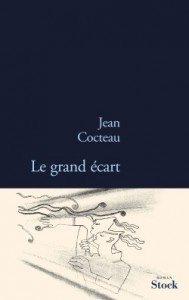Currently reading
The Miscreant , by Jean Cocteau

Jean Cocteau (1889-1963) wrote Le grand écart in 1923, shortly before he started Thomas l'imposteur and already under the influence of Raymond Radiguet (please see my review of Thomas l'imposteur for further background:
http://leopard.booklikes.com/post/628755/thomas-l-imposteur-by-jean-cocteau ),
so this novel, too, is an emotionally reserved narration in the style of the psychologizing and moralizing classic French authors of the 17th and 18th centuries and has many autobiographical elements. Cocteau always had a poet's eye, and it makes itself apparent in this text. He amuses himself and the reader with word play in this book, written with the serene elegance of his mid-period style. The story is not told quite as linearly and simply as it was in Thomas l'imposteur , and there are layers of irony, at least initially. There is also a heavy sprinkling of striking metaphors, such as
Un somptueux tir de foire, en miettes, c'est Venise le jour. La nuit, elle est une négresse amoureuse, morte au bain avec ses bijoux de pacotille.
(An ornate state fair shooting stand, in pieces, that's Venice by day. By night, she is a passionate Negress, dead in the bathtub wearing her cheap trinkets.)
which may not be everyone's cup of tea; but I like them, even though I am not at all certain what these metaphors are trying to communicate besides "ornate", "in ruins", "tawdry".
Jacques Forestier is a young and skinny bisexual who loves to do the opposite of what one expects, but always with a little twist. Those aspects of himself he finds unattractive, he emphasizes. Despising the kind of superiority which always pretends the negation of whatever the received opinion is, he adopts the received opinion, but modifies it so that those who share the received opinion don't recognize it. Jacques has an animal elegance, an artificial naturalness, is an aristocratic man of the people who despises the aristocrats and the people. Politically, he wants to be at the point where the extreme right touches the extreme left... So, you see, Cocteau is having some fun with Jacques. Jacques arranges to be wherever everybody else is not and, from that vantage point, observes all. This is all quickly forgotten.
Poor little Jacques is lonely and in heat, so he must go to where other people are, at least physically. As in Le livre blanc
http://leopard.booklikes.com/post/593219/le-livre-blanc-by-jean-cocteau
the search for love doesn't go very well for him, but for different reasons. The same is true for the little band of colorful, somewhat unlikely young characters thrown together by chance, straight, bi, gay. But this book has a great deal more charm and spirit than Le livre blanc . It is full of the witty little formules I enjoy reading:
Elle ressemblait à Germaine comme au marbre son moulage en plâtre. C'est dire qu'elles étaient pareilles, sauf tout.
(She resembled Germaine like the plaster cast does the original marble. That's to say they were alike, except in every way.) There's no way to reproduce this little bijou in English, sorry.
The core of the book is the relationship between Jacques and Germaine, which has the same structure as one of the relationships of the protagonist in Le livre blanc - she is an "actress" being kept by an older, rich man and Jacques catches her in bed with her girl friend. Unlike Le livre blanc, the story in this book is told with some sympathy and warmth; the initial irony of the opening is dropped while Cocteau revisits his own memories. In fact, the young Cocteau had such a relationship, and it apparently made quite an impression on him since he revisited it multiple times in his work.
Though this is a rather unusual love story, the emotions, the blindness, the obsession felt during the first love of a young man are the same here as in "normal" stories. The total paralysis when he realizes that it is over and all of his senses stop functioning, then the flood of incredible pain, denial, pain. And the distance between such emotions and those of a much more experienced person - in this case Germaine - is real and well evoked. This is the grand écart of the title. Behind it all, Cocteau demonstrates that while all relationships are accidental, their outcomes are inevitable.
There is yet more to this richly endowed little book. You really should consider reading it.
 3
3
 1
1












